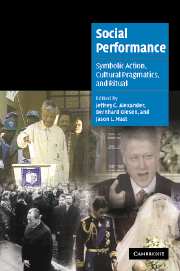Book contents
- Frontmatter
- Contents
- List of figures
- List of tables
- List of contributors
- Introduction: symbolic action in theory and practice: the cultural pragmatics of symbolic action
- 1 Cultural pragmatics: social performance between ritual and strategy
- 2 From the depths of despair: performance, counterperformance, and “September 11”
- 3 The cultural pragmatics of event-ness: the Clinton / Lewinsky affair
- 4 Social dramas, shipwrecks, and cockfights: conflict and complicity in social performance
- 5 Performing a “new” nation: the role of the TRC in South Africa
- 6 Performing opposition or, how social movements move
- 7 Politics as theatre: an alternative view of the rationalities of power
- 8 Symbols in action: Willy Brandt's kneefall at the Warsaw Memorial
- 9 The promise of performance and the problem of order
- 10 Performance art
- 11 Performing the sacred: a Durkheimian perspective on the performative turn in the social sciences
- Index
- Cambridge Cultural Social Studies
- References
3 - The cultural pragmatics of event-ness: the Clinton / Lewinsky affair
Published online by Cambridge University Press: 07 December 2009
- Frontmatter
- Contents
- List of figures
- List of tables
- List of contributors
- Introduction: symbolic action in theory and practice: the cultural pragmatics of symbolic action
- 1 Cultural pragmatics: social performance between ritual and strategy
- 2 From the depths of despair: performance, counterperformance, and “September 11”
- 3 The cultural pragmatics of event-ness: the Clinton / Lewinsky affair
- 4 Social dramas, shipwrecks, and cockfights: conflict and complicity in social performance
- 5 Performing a “new” nation: the role of the TRC in South Africa
- 6 Performing opposition or, how social movements move
- 7 Politics as theatre: an alternative view of the rationalities of power
- 8 Symbols in action: Willy Brandt's kneefall at the Warsaw Memorial
- 9 The promise of performance and the problem of order
- 10 Performance art
- 11 Performing the sacred: a Durkheimian perspective on the performative turn in the social sciences
- Index
- Cambridge Cultural Social Studies
- References
Summary
Introduction
Imagined communities generate events that compel community-wide attention, regardless of size or degree of social and cultural differentiation. Early in the twentieth century Durkheim famously argued there “can be no society that does not experience the need at regular intervals to maintain and strengthen the collective feelings and ideas that provide its coherence and its distinct individuality” ([1912] 1995: 429). Rituals, he specified, represent the processes through which solidarity and collective identity are rejuvenated. While social and cultural differentiation has made ritual-like processes in twenty-first-century America more difficult to sustain, this imagined community (Anderson 1983) continues to produce events that draw issues of collective identity and solidarity to the fore of its individuals' consciences (cf. Larson and Wagner-Pacifici 2001).
Contemporary ritual-like events, however, differ markedly from the processes Durkheim described. They are subject to much higher degrees of conflict, disconsensus, and contingency. Victor Turner (1969, 1974, 1982) responded to this critical fact when he pushed his ritual framework towards the theory of social dramas. Social dramas represent events in the making that compel community-wide attention, generating narratives, oftentimes conflicting, that define and explain what has occurred and its seriousness. The Clinton/Lewinsky Affair, which dominated the national spotlight in 1998, was just such a drama. It appeared to erupt from an initial occurrence for which the vast majority of the country's citizens wanted, if not demanded, an explanation and some form of redressive action.
- Type
- Chapter
- Information
- Social PerformanceSymbolic Action, Cultural Pragmatics, and Ritual, pp. 115 - 145Publisher: Cambridge University PressPrint publication year: 2006
References
- 20
- Cited by



